How to Benchmark Your Brand for Scalable Growth
Introduction: Why a Marketing Audit is Critical Before Launching New Initiatives
Before investing in new marketing initiatives, it’s essential to take a step back and evaluate the current landscape. A marketing audit provides a comprehensive assessment of your brand’s positioning, tools, analytics, and customer engagement strategies. Without this crucial step, businesses risk pouring resources into tactics that don’t align with their goals or target audience. By conducting a marketing audit, companies can make data-driven decisions, refine their messaging, and position themselves for scalable growth.
Step 1: Assessing Current Marketing Tools, Platforms, and Analytics
A strong marketing strategy is only as effective as the tools and systems that support it. Evaluating your marketing stack ensures that your resources are optimized for performance and efficiency.
Key Areas to Analyze:
- Website & User Experience: Is your site fast, mobile-friendly, and optimized for conversions?
- SEO & Organic Visibility: Are you ranking for relevant keywords? Do you have a strong content strategy?
- Marketing Automation & CRM: Are you using the right platforms to track leads and nurture prospects?
- Social Media & Advertising Performance: Are your campaigns driving meaningful engagement and conversions?
- Analytics & Reporting: Do you have clear KPIs and data-driven insights to inform decision-making?
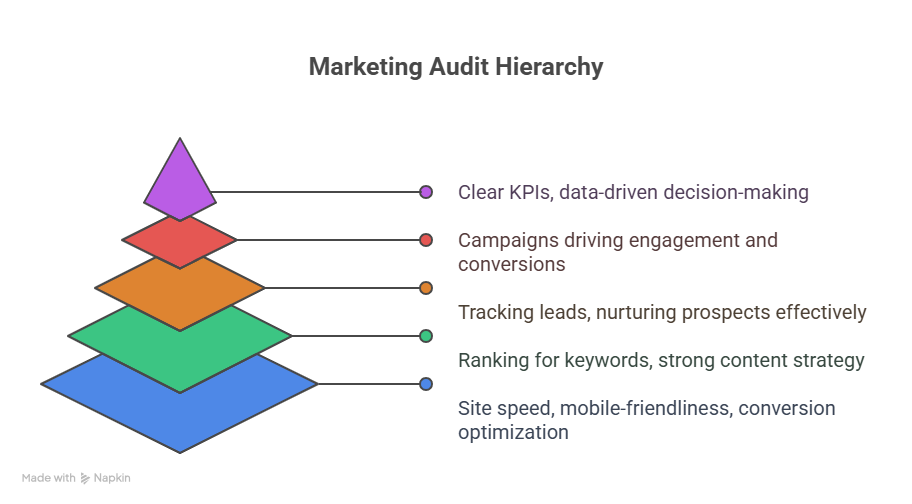
Step 2: Competitive Benchmarking – Understanding Industry Trends & Positioning
To stand out in a crowded marketplace, it’s crucial to understand where your brand fits within the competitive landscape. Benchmarking helps identify gaps, opportunities, and areas for differentiation.
Competitive Analysis Strategies:
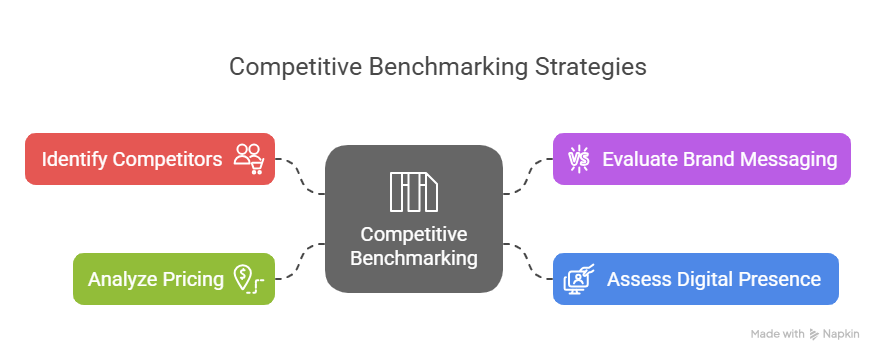
- Website & User Experience: Is your site fast, mobile-friendly, and optimized for conversions?
- SEO & Organic Visibility: Are you ranking for relevant keywords? Do you have a strong content strategy?
- Marketing Automation & CRM: Are you using the right platforms to track leads and nurture prospects?
- Social Media & Advertising Performance: Are your campaigns driving meaningful engagement and conversions?
- Analytics & Reporting: Do you have clear KPIs and data-driven insights to inform decision-making?
Step 3: Developing Customer Personas & Mapping Their Journey
Understanding your ideal customers is key to crafting compelling messaging and conversion-driven marketing strategies. By diving into their needs, behaviors, and decision-making processes, businesses can create personalized experiences that drive engagement and loyalty. Effective customer insights also enable smarter targeting, ensuring marketing efforts resonate with the right audience at the right time.
Creating Detailed Customer Personas:
- Demographics & Firmographics: Who are your target customers? What industries do they belong to, and what roles do they hold?
- Pain Points & Challenges: What problems are they trying to solve, and how does your product or service address these needs?
- Decision-Making Process: What influences their buying decisions? Are they driven by cost, quality, brand reputation, or innovation?
- Preferred Channels & Content Consumption: Where do they engage with content, and what type of content resonates most? Understanding this helps tailor outreach for maximum impact.
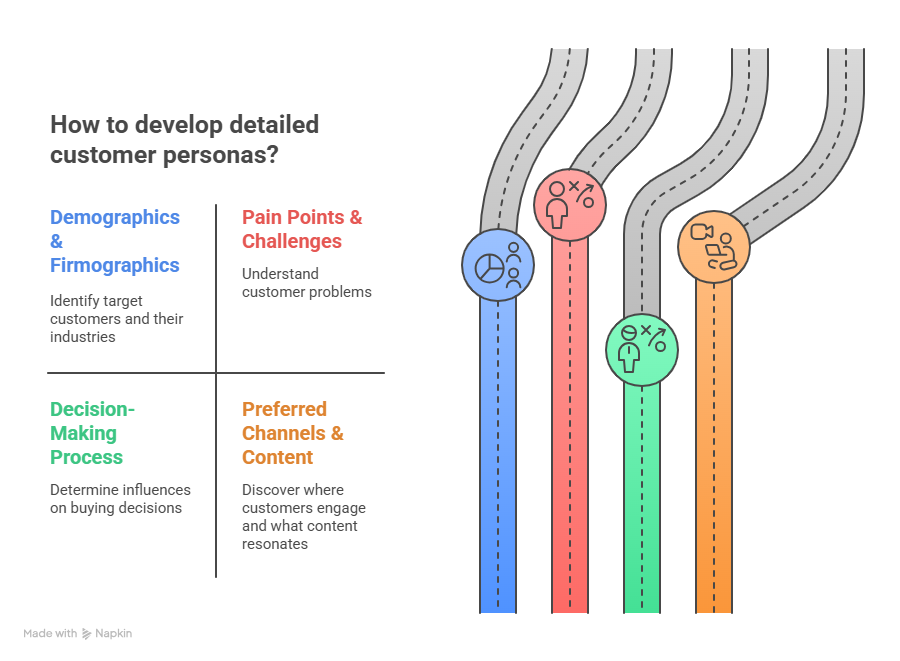
Customer Journey Mapping:
Mapping out the customer journey allows businesses to optimize touchpoints and remove friction in the sales funnel. By identifying key interactions, businesses can ensure a seamless experience that nurtures leads and enhances customer satisfaction. A well-structured journey also provides valuable insights into behavioral patterns, enabling companies to anticipate needs and personalize their approach for better conversions.
- Awareness Stage: How do potential customers first discover your brand? What challenges or questions lead them to seek out a solution?
- Consideration Stage: What information do they seek before making a decision? Do they need case studies, testimonials, or product demos?
- Decision Stage: What factors drive conversion, and how can you facilitate a seamless purchasing experience? Streamlining checkout or sales processes improves conversion rates.
- Post-Purchase Stage: How do you ensure continued engagement and customer retention? A strong post-sale strategy leads to referrals and long-term loyalty.
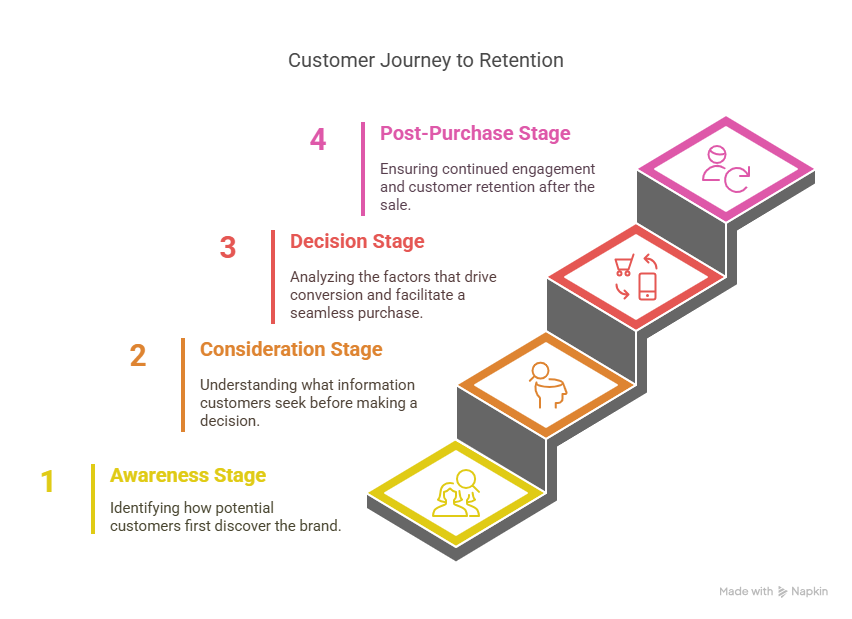
Step 4: Building a Data-Driven Strategic Roadmap for Long-Term Success
With insights from the marketing audit, it’s time to develop a strategic roadmap. This plan should align with business goals, customer needs, and market trends.
Key Components of a Strategic Roadmap:
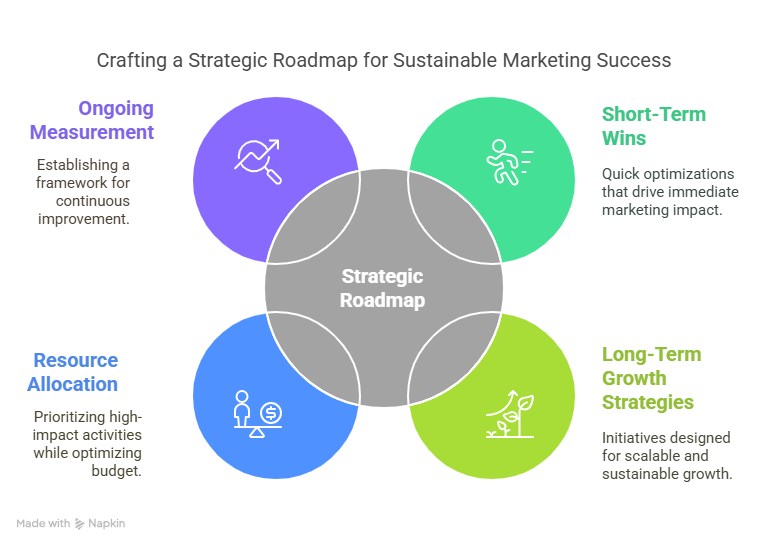
- Short-Term Wins: Quick optimizations that can drive immediate impact (e.g., SEO improvements, landing page optimizations, email nurturing sequences).
- Long-Term Growth Strategies: Scalable initiatives such as brand repositioning, content marketing expansion, or new channel exploration.
- Resource Allocation & Budget Planning: Prioritizing high-impact activities while optimizing spend to maximize ROI.
- Ongoing Measurement & Optimization: Establishing a framework for continuous improvement, A/B testing, and performance tracking ensures that efforts stay effective over time.
Case Study: A Company That Improved ROI After a Comprehensive Audit
To illustrate the impact of a marketing audit, consider Company X, a B2B technology startup struggling with low lead conversion rates. After conducting an audit, they identified key gaps in their SEO strategy, improved their content marketing approach, and streamlined their lead nurturing process. Within six months, they experienced:
- A 40% increase in organic traffic due to targeted content optimizations and SEO refinements.
- A 25% boost in lead conversion rates through improved UX, clearer CTAs, and personalized email automation.
- A 30% reduction in marketing costs by reallocating budget to high-performing channels and cutting ineffective campaigns.
By taking a data-driven approach, Company X positioned itself for sustained growth and improved marketing ROI.
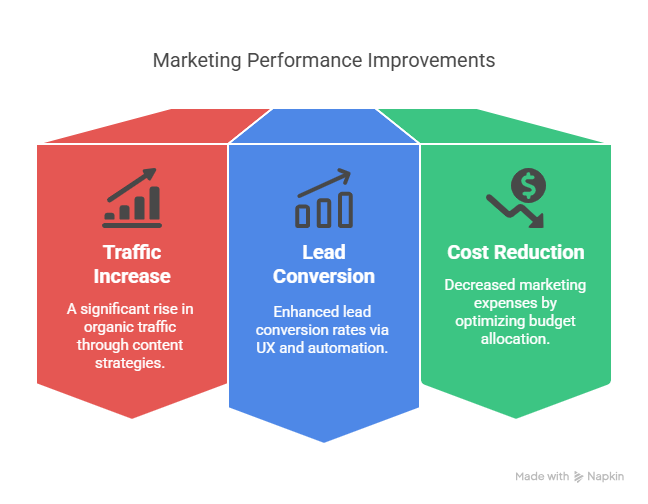
Conclusion: Take the First Step Toward Scalable Growth
A marketing audit is the foundation of a successful growth strategy. By evaluating existing efforts, analyzing the competitive landscape, and aligning tactics with customer needs, businesses can make smarter marketing decisions that drive long-term success.



